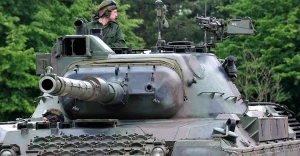
In autumn, Ukraine will be urged to swallow "bitter pill" of compromise – The Guardian
Simon Tisdall, deputy editor-in-chief and columnist of the British outlet The Guardian, described how, in his opinion, the West will persuade Kyiv to make concessions in the war
His column was published today, April 23, 2023.
"While maintaining its claim to four regions illegally annexed last year, Russia eventually agrees to a conditional ceasefire. Vladimir Putin hails the “strategic neutralization” of Ukraine. President Volodymyr Zelenskiy is obliged to temporarily postpone his drive to restore his country’s pre-2014 borders. In return, Ukraine is spared further, unsustainable human, economic and infrastructure losses, while retaining roughly 85% of its territory. An internationally monitored, Korean-style “demilitarized zone” freezes frontlines in place. The missiles stop coming. Rebuilding can begin. Refugees come home," Tisdall writes.
He suggests that in this case, the USA and its Western European NATO allies will be able to declare that the sovereign independence of democratic Ukraine and the world order, based on rules, have been saved. However, Poland and other Eastern European states will be dissatisfied with this, Ukraine's accession to the EU will once again be in limbo, and NATO membership will become unattainable. At the same time, the risk of resumption of war will be a constant threat and a source of fear.
"If this scenario, or something like it, transpires over the coming year, many Ukrainians will inevitably feel betrayed. US President Joe Biden’s pledge to “do whatever it takes” to repel Russia will go unfulfilled. Putin will survive in power despite his many atrocious crimes. Yet like it or not, this increasingly appears the most likely outcome," he says.
"Is shoddy compromise unavoidable? No. In theory, either side could yet win a decisive victory. But much more likely, absent a deal, is a bloody, costly, low-intensity stalemate, dragging on for years," Tisdall notes.
The prospect of a smoldering "dead end" does not suit anyone, except, perhaps, China and weapons manufacturers, the analyst emphasized.
"The west should do more now to help Ukraine advance on the battlefield, putting it in the best position possible at the negotiating table later this year," Tisdall quoted US diplomat Richard Haass and Georgetown University professor Charles Kupchan.
"Gloomy leaked Pentagon assessments of Ukraine’s prospects, and America’s election timetable, reinforce expectations of a US-backed shift towards talks this autumn," he continues.
"So everything rides on the coming offensive. Already dubbed “Ukraine’s longest day”, it could determine the country’s long-term relationship with both east and west. For now, Zelenskiy, backed by 64% of Ukrainians, is sticking, in public at least, to his maximalist position – that every last inch of occupied territory be liberated. Yet even as his troops move into position, Zelenskiy is surely aware of the rear echelon second-guessing and political calculation that is going on between allies behind his back. To end their pain and suffering, Ukrainians may soon be asked to swallow a very bitter pill," he concludes.
-
According to Estonian Defense Minister Hanno Pevkur, the biggest obstacle to the start of the Ukrainian counteroffensive remains the rainy weather, and another month will pass before the active hostilities can start.
- News














































